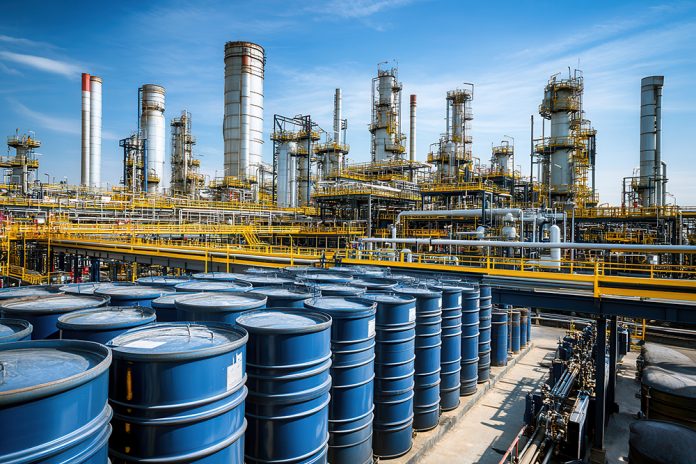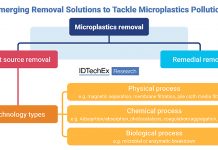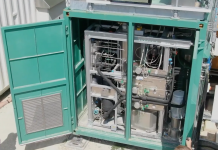Producing many of the everyday products that we take for granted, the chemical industry is a major contributor to air and water emissions, as well as a significant consumer of energy. Peter Cologne, UK & Ireland Sales Manager for ABB Measurement & Analytics, explains how the latest generation of measurement technology is enabling chemical companies to find ways to reduce the environmental impact of their operations.
Growing pressures to simultaneously reduce environmental impact, minimise energy consumption, optimise operations, and enhance safety are driving chemical companies to rethink both what they produce and how they produce it.
The inherently carbon-intensive nature of many chemical production processes means that the chemical industry is responsible for around 5 percent of global CO2 emissions. The need to minimise these emissions, coupled with the need to boost sustainability, is seeing a drive for significant changes to ensure that the chemical industry of the future is fundamentally compatible with a low or zero-carbon society.
Measurement technologies are already playing a critical role in chemical production, providing the data needed to monitor, control, and improve the performance of production processes. The availability of accurate, real-time measurements enables chemical companies to address challenges such as regulatory compliance, cost control, and environmental sustainability. Crucially, data allows them to do in a way that is cost-effective, and without compromising the integrity and efficiency of operations.
Ensuring compliance with environmental regulations
The need to meet environmental regulations is an evergreen challenge for the chemical industry. Aimed at driving reductions in emissions and waste, these regulations are becoming increasingly stringent.
Chemical processes typically involve complex reactions that can produce various emissions, including greenhouse gases, volatile organic compounds (VOCs), and particulates, all of which require accurate measurement to ensure compliance with both local and international regulations.
With features including enhanced diagnostics, communications, reporting and connectivity, the latest generation of measurement systems provide continuous, accurate tracking of emissions. When combined with real-time analytics, they are opening new possibilities for producers to fine-tune processes to reduce waste and improve the environmental footprint of their operations.
The importance of emissions monitoring has been further emphasised with the introduction of sustainability reporting requirements. Companies typically have to record and report their emissions and can face severe penalties for not doing so. Advanced gas analyzers and flow measurement solutions allow users to confidently and reliably quantify their emissions and demonstrate adherence to both environmental and sustainability standards.
Enhancing operational efficiency through real-time data
Operational efficiency is crucial in the chemical sector, where even minor deviations in temperature, pressure, or flow rates can significantly impact product quality and profitability.
By providing real-time data on critical process parameters, measurement technology plays a vital role in achieving and maintaining optimal operating conditions. High accuracy flowmeters with features such as digital signal processing and Ethernet-APL for high-speed data transmission, for example, enable operators to monitor and adjust fluid flows with a high degree of precision, minimising waste and reducing energy consumption.
Advanced measurement systems are also being integrated with sophisticated analytics that can detect anomalies early, helping to prevent unplanned downtime and improve overall productivity.
This is particularly valuable in the context of process automation, where real-time measurement data supports predictive maintenance strategies and reduces the need for manual oversight.
Companies investing in next-generation measurement technology gain a competitive advantage through enhanced productivity, enabling them to find new ways to reduce costs and increase profit margins.
Opening the way to sustainable production
Measurement is also key as the chemical industry takes steps to shift from linear to circular production. By using instruments and analyzers in their processes wherever possible, companies can monitor material flows, optimise resource use, and minimize waste. Level and pressure measurements, for example, can be used to track material inputs and outputs, enabling operators to spot production inefficiencies.
Measurement data can also be used to improve environmental performance by reducing reliance on non-renewable resources and maximising process energy efficiency. These solutions can often be retrofitted onto existing processes, reducing the amount of up-front investment required, and allowing processes to be modernised in a more manageable way rather than all at once.
With vast quantities of water being used throughout chemical production processes, measurement devices such as pH analyzers and conductivity sensors have an important role in ensuring sustainable production by continuously monitoring water quality. By accurately monitoring a variety of parameters, these devices can help operators to check and maintain their compliance with regulatory standards at all points in their processes, from initial treatment of incoming water through to final effluent discharge. Monitoring water quality and chemical concentration levels will also help to make sure that sustainability targets are being met by reducing water consumption and enhancing resource efficiency.
Improving safety
Chemical plants are inherently high-risk environments, where hazardous reactions and materials are handled on a daily basis, making both worker and environmental safety a top priority. Accurate measurements of temperature, pressure, and gas concentrations allow operators to identify and respond to potential hazards before situations risk escalating uncontrollably. For example, gas analyzers can detect leaks or unsafe gas concentrations, enabling rapid corrective action to protect workers and the surrounding environment.
Furthermore, measurement systems that offer real-time data can support automated shutdowns or alarm protocols in the event of unsafe conditions. These safety mechanisms are critical in preventing incidents and maintaining a safe working environment. With advances in digital and wireless measurement technology, operators can monitor hazardous zones remotely, boosting worker safety by reducing the need for human intervention in potentially dangerous areas.
Digitalisation for greater insight and control
Digital transformation is reshaping the chemical industry, and measurement technology is a key enabler of this shift. Through digitalization, chemical producers can gain more detailed insights into their processes and make data-driven decisions to improve efficiency and reduce costs. Measurement solutions with integrated digital capabilities provide continuous streams of data that can be gathered and analysed to detect inefficiencies, predict equipment failures, and optimise resource use.
With cloud connectivity, some advanced measurement systems allow for remote monitoring, diagnostics, and maintenance, enhancing flexibility and operational control. The ability to centralise and analyse large volumes of data is essential for companies aiming to maximise productivity while minimising their environmental impact.
Innovation in measurement for a sustainable future
The role of measurement technology will grow in importance as the chemical industry continues to evolve. Innovations in sensor technology, data analytics, and digital integration are already providing the tools companies need to navigate a challenging landscape marked by complex regulatory requirements, environmental responsibilities, economic pressures and shrinking engineering teams. Through advanced measurement solutions, companies can achieve greater process control, improve resource efficiency, and enhance the safety of their operations, all while working towards a more sustainable production model.
Companies that invest in advanced measurement technologies not only ensure compliance and safety but also gain critical insights to drive innovation and sustainability. The role of companies like ABB in providing reliable, innovative measurement solutions highlights the critical intersection of technology and industry needs as the chemical sector adapts to a rapidly changing world.










